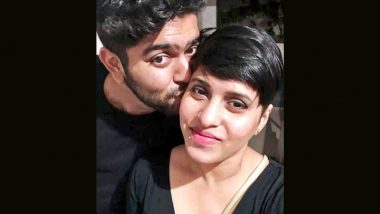New Delhi, November 23: Forensic experts and lawyers who have dealt with cases where the victims were chopped into several pieces suspect the use of a big saw-teeth knife by Aaftab Amin Poonawala, accused of killing his live-in partner Shraddha Walkar and cutting her body into 35 pieces.
In Walker's case, the Delhi Police hasn't been able to recover the weapon(s) yet. However, some media reports suggested the use of a large chopper or a saw-like knife in the crime. Shraddha Walkar Murder Case: ‘I Was Provoked, I Hit Her’, Says Aftab Amin Poonawala in Saket Court.
Police have asserted that Poonawala has confessed to his crime, though his lawyer has contested this claim. The experts say that the weapons used in such cases in the past were either electric cutters or a saw-teeth knife of a minimum size of 18 to 20 inches.
Criminal lawyer R V Kini, who had represented the prosecution in film producer Neeraj Grover murder case in 2008, recalled how the convicts -- Maria Monica Susairaj and Emile Jerome Joseph -- murdered the victim, chopped his body into more than 30 pieces, put the mutilated body parts in a bag and tried to burn it on the outskirts of Mumbai. Shraddha Walkar Murder Case: Aftab Ameen Poonawalla’s Polygraph Test Today at Forensic Science Laboratory in Rohini.
"They had used two weapons, one chopper with a thin blade and another knife with saw-like teeth which was about 18 inches long along with its handle. The body was highly mutilated so it was difficult to exactly recollect the number of pieces but I think they were more than 30," Kini said. "I believe a similar type of weapon might have been used in Shraddha Walker's murder," Kini added.
In another such case, Rajesh Gulati murdered his wife in Dehradun in 2010 and reportedly cut her body into more than 70 pieces using an iron cutter, a wood chipper and a stone cutter. Police had also recovered a booklet of instruction on how to use the iron cutter.
J S Virk, Deputy Advocate General for the Uttarakhand government, who had appeared for the prosecution in the case, said that Gulati, after murdering his wife, tried to destory the identity of her body and so he used multiple weapons to cut the body into several pieces.
"News reports had said that he cut the body into over 70 pieces but they were incorrect. I roughly remember that he made several pieces of the body, about 30 or 40, and put it into a deep freezer which he had purchased from the market for the same purpose," Virk said.
He added, "There is a stark resemblance between the criminal act of Gulati and Aaftab. Both tried to dispose of the chopped body pieces by throwing them at various places."
A senior forensic doctor working with a government hospital spoke to PTI on the condition of anonymity about criminal dismemberment of the human body.
He said that he performed postmortem of victims cut into several pieces by the criminals and going by the anatomy of the human body, a body can be easily cut into 12 to 13 pieces from the joints.
"However, one needs an electrically-powered saw or cutter to make more than 13 pieces of the body. Such weapons can take a few minutes to chop the body into pieces," he said.
He added, "Since an electric cutter makes a lot of noise, often criminals use hand-operated saws which take a lot of effort and time. There are cases when multiple weapons are also used to first peel off the skin with a sharp knife and then cut the bones with a saw-teeth chopper."
He said that the saw cannot run smoothly on the skin but once the skin is removed from the bone, it makes the cutting of bone easy. Twenty-eight-year-old Poonawala allegedly strangled his live-in partner Walkar and sawed her body into 35 pieces which he kept in a 300-litre fridge for almost three weeks at his residence in south Delhi's Mehrauli before dumping them across the city over several days past midnight. The murder occurred in May.
(The above story is verified and authored by Press Trust of India (PTI) staff. PTI, India’s premier news agency, employs more than 400 journalists and 500 stringers to cover almost every district and small town in India.. The views appearing in the above post do not reflect the opinions of LatestLY)













 Quickly
Quickly


